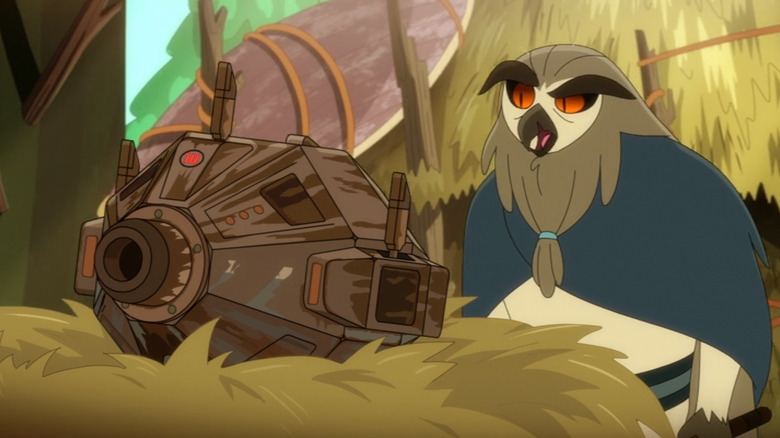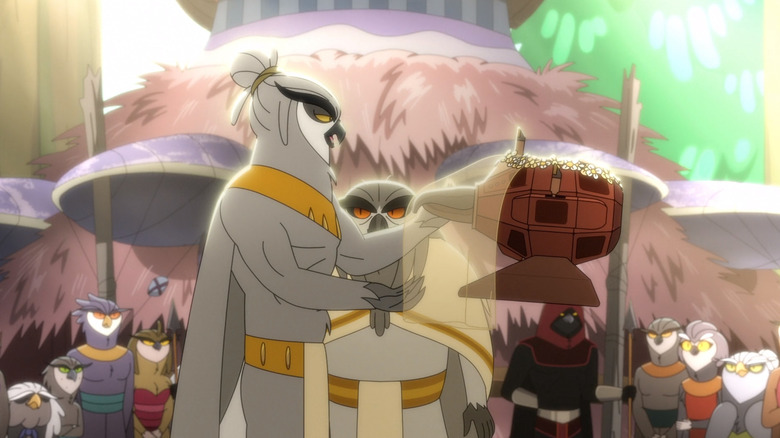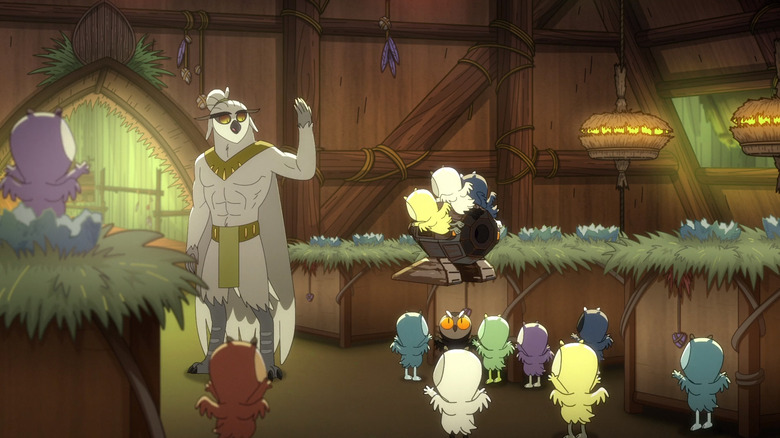Star Trek: Lower Decks Season 3 Takes Its Biggest Narrative Swing Yet — And It Doesn't Work At All
This article contains spoilers for the latest episode of "Star Trek: Lower Decks."
"Star Trek: Lower Decks" is a brilliant blend of animated workplace comedy and genuine "Star Trek" series, but the most recent episode, "A Mathematically Perfect Redemption," tried something completely different. It abandoned the entire crew and followed a returning guest character from season 1, going off on a unique adventure and only bringing the U.S.S. Cerritos back in at the end. It's a bold swing, but unfortunately, it just doesn't pay off because the episode feels like it belongs on another adult animated comedy.
In the episode, former Ensign Peanut Hamper (Kether Donohue), the exocomp who launched herself out into space instead of undertaking a dangerous mission to help save the crew of the Cerritos in the season 1 finale, finds herself stranded on a primitive planet inhabited by bird people. Her actions there aren't exactly becoming of a Starfleet officer, and the tone flies in the face of the hopeful, earnest nature of the franchise. "Star Trek" can be crass, it can be horny, and it can occasionally be mean, but combining all of those things without any sort of lesson to it all is a big miss.
The McMahan of it all
"Star Trek: Lower Decks" showrunner Mike McMahan once worked on "Rick & Morty" and is also co-showrunner on "Solar Opposites" with Justin Roiland, so comparisons to those shows and "Lower Decks" are hard to avoid. While "Lower Decks" struggled a bit to find its footing in the first season, that's pretty typical of "Star Trek" shows and wasn't a deal-breaker. Occasionally, the humor was too crude or the lessons were lost in the half-hour comedy format, but by the end of season 1, "Lower Decks" had found its groove as a genuine "Star Trek" series. Some fans were shocked by the orgy sequence in the season 2 episode "I, Excretus," and declared that it was too much like "Rick & Morty" for comfort, but "Star Trek" at least has a long history of horniness.
The orgy sequence was a very brief diversion in an otherwise "Trek"-driven episode, but the entirety of "A Mathematically Perfect Redemption" is the same kind of diversion, and it shares quite a bit of DNA with McMahan's other animated adult comedies. The avian species and their home world is pretty similar to the character of Birdperson from "Rick & Morty," and episodes that completely abandon the main characters and story are right at home in "Solar Opposites." Unfortunately, none of it works here.
Lessons need to be learned
After the brilliance of the previous episode, which showed the crew of the Cerritos visiting Deep Space Nine and catching up with old friends, episode seven feels like even more of a let-down. While the side-quest episodes in "Solar Opposites" are some of that series' best, that kind of tactic only works in "Lower Decks" if it still feels like "Star Trek." Instead, there's an interspecies sex scene played entirely for laughs, a protagonist who doesn't learn or change, and a bunch of bird-related humor. I'm not sure why the idea of bird people is so darn funny to these cartoon creators, but I am going to blame "Harvey Birdman: Attorney at Law" at least a little.
The big problem, ultimately, lies in Peanut Hamper. Kether Donohue's performance is funny, but the character is too nihilistic to play a leading role within the "Star Trek" franchise. There are plenty of villainous characters in "Star Trek" who get a chance to shine, but they are all still fully faceted people who grow and chance. Even Gul Dukat (Marc Alaimo) went through some pretty major changes, and he might be the franchise's nastiest fascist villain. Peanut Hamper's self-serving behavior and unwillingness to learn or change makes her a "Star Trek" outlier, and makes this episode one of the weakest in all of "Lower Decks."
New episodes of "Star Trek: Lower Decks" premiere Thursdays on Paramount+.


